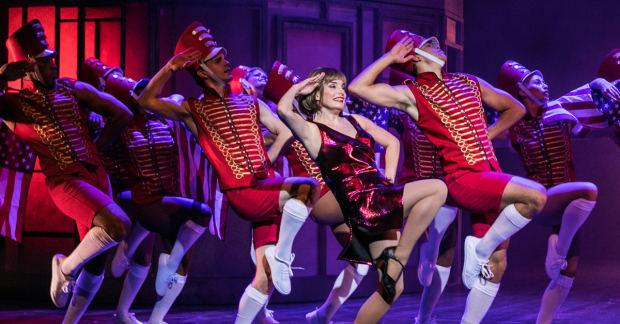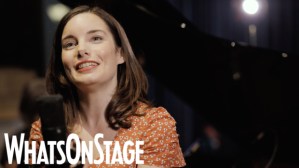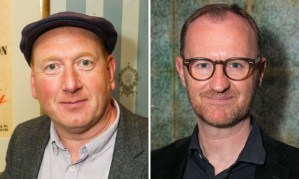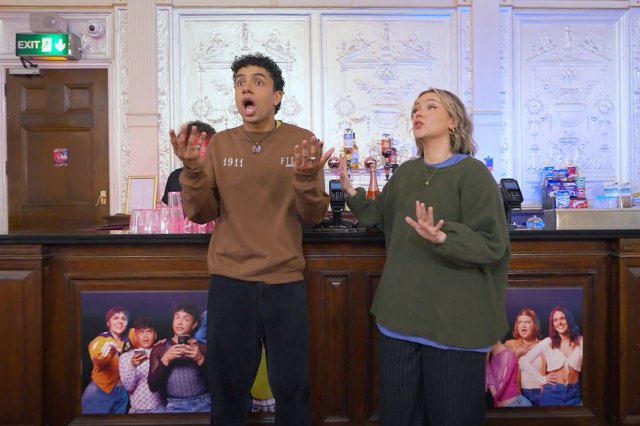Review: Sweet Charity (Nottingham Playhouse)
Bill Buckhurst directs Rebecca Trehearn in a revival of ”Sweet Charity” at Nottingham Playhouse

© Nottingham Playhouse
Ambling from Central Park to Coney Island, Sweet Charity has always been a picture postcard of New York. Cy Coleman's musical, with a book by the late Neil Simon, takes a bite of the Big Apple, and its protagonist Charity Hope Valentine is a flaneur soaking it all in – skyscrapers and sidewalks, high society and low life. It is, indeed, a hell of a town, but for lovelorn Charity, it's purgatory.
By loosening the original 1960s setting, Bill Buckhurst's razzamatazzy revival gives us a timeless metropolis, where vintage Yankees ballers cross paths with rollerskating Harlemites and beat boys bump into Italian ice cream carts. It's like every 20th century Manhattan squeezed into one; the suggestion being that the city that never sleeps never much changes either.
In her mousy brown bob, Rebecca Trehearn's Charity has shades of a more recent New Yorker: Girls' Hannah Horvath. Like Lena Dunham's muddled millennial, she's stuck in a deadbeat job she despises – a dance hall taxi dancer, escort work in today's terms – and, for all her apparent free-spiritedness, Charity sees love as the only way out.
Both women treat their "heart as a hotel", lining up dates to be duped or dumped again. They share the same klutziness – Charity's starts floundering in a boating lake and Trehearn's legs are always at odd angles – and the same eternal optimism too; open to anything the big city throws up. It takes Charity all over – from a Hollywood star's closet to a broken down life. For all her sense of adventure, Charity's always getting stuck. "Without love", she's fond of repeating, "life has no purpose". Fifty years on, we're still in thrall to that idea.
Buckhurst finds other constants – a rigid, hollow sense of gender, and an urban anomie. Caught between Hollywood heartthrob Vittorio Vidal (a purring Jeremy Secomb) and Marc Elliott's human anxiety attack Oscar Lindquist, Charity cuts through the mirage of masculinity that holds such sway. The same's true of femininity and the Fandago Club's dancers posture and pout on the shop floor, only to blob out backstage. Carly Mercedes Dyer and Amy Ellen Richardson swab their sweat stains and sit legs akimbo, smoking like troopers, in their dank dressing room and their duets, pining for better lives, are gorgeous. Alistair David's choreography smartly subverts "Big Spender's" sultriness with girls merely going through the motions: all big hair and blank stares. "Say, wouldn't you like to know what's going on in my mind?"
But then everyone in New York is on auto-pilot and David's other routines, brilliantly blending 60s swing with more contemporary styles, has a robotic quality broken only by the shuddering ecstasy of the "Rhythm of Life" church. Buckhurst shows us a city of social tribes – Studio 54's slickers and mackintoshed commuters – all vaguely unsatisfied with their lot. If Charity stands out – all breezy cheer and outward hope – Trehearn's winning in the role, bursting into girlish joy in "If My Friends Could See Me Now", but never losing sight of the melancholy beneath.
Coleman's score and Dorothy Fields' lyrics have their joyous highs, but for all its contemporaneity, Simon's script seems out of time. It takes a full three hours to say something slight, and its story struggles to sustain. It's not helpd by the sluggish scene changes of Takis' evocative NY design, which catches the city's surface glitz and backstage grime. New York's no different today: bright lights and big hopes hide all kinds of heartbreak.




















